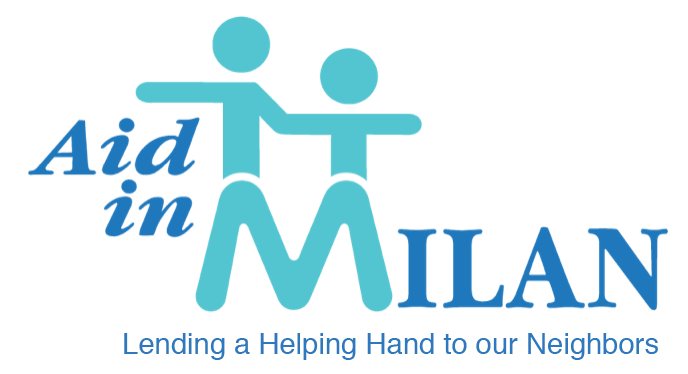What Makes a Healthy Community?
A healthy community requires that everyone have access to at least 6 things:
quality education
safe and healthy homes
adequate employment
physical activity
proper nutrition, and
health care
At a later time, we’ll discuss why each of these things are important, but for now, I’d like to discuss how Aid in Milan seeks to remove barriers to accessing these components to a healthy community and empower each client to become self-sustaining.
We do this through first addressing the crisis that brings someone to us, since a person in crisis cannot begin solving the underlying cause of an issue until immediate problem has been addressed. You’ve heard the adage: “teach a man to fish and you feed him for a lifetime.” We agree that long-term it is better to give people the tools to take care of themselves. However, it’s extremely difficult for a child to learn on an empty stomach. And it’s just as difficult for an adult to think clearly about how to deal with finding a better paying job or a safer neighborhood when their stomach is growling. We believe that we can both feed someone and THEN teach them fish. In fact, at Aid in Milan, we believe that this model has better results than handing a starving person a fishing pole and hoping that they find some bait and a place to fish.
Our pantry programs meet this basic human need. And we do it in a way that maintains dignity and provides farm-to-table nutrition that is critical for brain and body development in children, and healthy aging for adults.
The second part of Aid in Milan’s model that makes our program successful is that we make everyday decisions easier. Imagine being forced to choose between the medicine you need to get over your cold, or a birthday present for your child. What if the choice was between gas to get to work or your utility bill? Have you ever had to ration shampoo for your family or baby wipes for a newborn? What happens when you have to go back to work right after your baby is born, and you can’t afford both diapers and formula- but you can’t pump breastmilk at work because there’s no place to store it and you don’t have enough breaks anyway.
These are the choices that poverty gives to families everyday. Impossible choices with long-term financial consequences.
Our direct aid programs make these decisions a little easier by offering one-time rent, utility or prescription co-pay assistance to avoid further financial complications. And our ancillary programs provide Christmas presents or a full birthday party kit and birthday present for a client’s child so that families can experience the very important and necessary moments of joy in spite of stressful life situations. Everyone deserves to take a break from financial stress.
Families who live under constant financial pressure see physical manifestations as well. Financial anxiety differs from everyday money worries. It is a constant, all-consuming stress that can become debilitating. Prolonged financial stress becomes an even bigger problem when the brain starts dumping cortisol into the body- causing a person to feel constantly on edge. They are unable to ever relax or recharge and this affects their ability to make good decisions. Soon, the best a person can do is barely keep their head above water. The slightest wave could capsize their boat. Is it any wonder, then that people living in poverty are 13x more likely to have a heart attack, 20% more likely to experience consistent migraines, 4x more likely to experience insomnia and a whole host of other physical and mental issues?
Prolonged financial stress increases long term health care costs, and ironically- people living in poverty tend to delay getting the care they need until a crisis situation because they often can’t afford preventive or interventional care. Meaning that by the time they do get care- not only are they physically, mentally, and psychologically worse off: they are financially worse off too. Not only are the medical bills more expensive, but unhealthy, poorly-rested people miss more days of work and school- creating a cycle of unhealthy communities and further financial ruin.
Aid in Milan’s programs disrupt that cycle one person and incident at a time.
